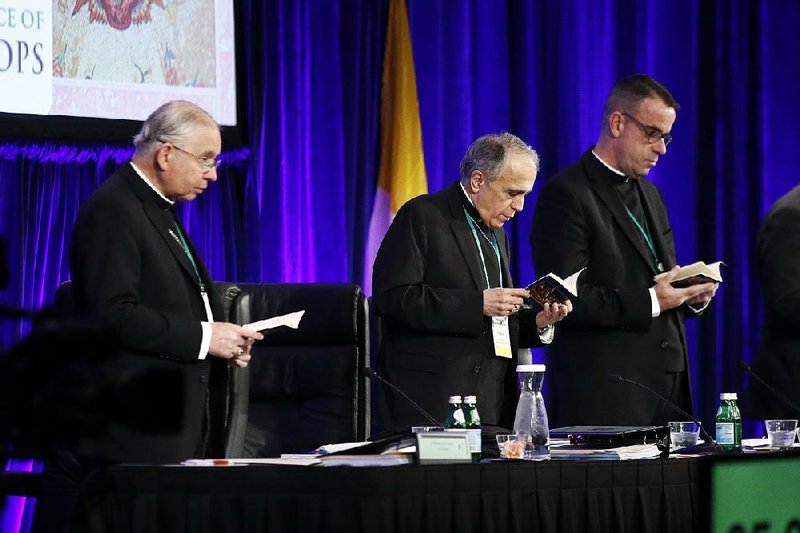BALTIMORE -- One day after the Vatican halted its plans to vote on sex abuse accountability measures, U.S. bishops Tuesday began their first open debate since the crisis began this summer about what they can and should do to better police themselves.
The bishops had planned for the core of their annual fall meeting to discuss and then vote on measures such as a code of conduct for themselves and on a lay committee to investigate bishop misconduct. But the first minute of the meeting Monday saw the U.S. Conference of Catholics Bishops' president, Cardinal Daniel DiNardo, tell the huge ballroom of bishops that the Vatican wanted them to hold off on voting until a global meeting could be held next year.
On Tuesday, the bishops proceeded with debate as planned. Some bishops had floated the idea of a nonbinding vote; however, DiNardo said the body would discuss the sexual abuse resolutions but would not commit to taking any votes -- not even nonbinding ones.
The bishops also heard strong words from the chairman of their National Review Board, a lay-led body the bishops set up in 2002 to monitor how well the U.S. church is doing on the abuse issue.
More than 130 bishops, Francesco Cesareo told the conference, quoting media reports, "have been accused during their careers of failing to respond to sexual misconduct in their dioceses. Others have been accused of committing abuse. Few have faced real consequences. This must change."
The exact words used by the Vatican's Congregation of Bishops in telling the Americans not to vote weren't known Tuesday, but DiNardo said the halt was aimed at keeping unity in the global church on procedures.
Some church-watchers said some in Rome don't want the U.S. church to appear to be ahead of other parts of the world.
Bishops Tuesday had the opportunity to fine-tune the proposals for a lay committee to investigate bishops' misconduct and for a code of conduct for bishops. After the bishops suggest amendments, the group will discuss the same proposals again today. But if they stick with their current plan, they won't vote.
On Tuesday, debate came fast.
Before DiNardo said he wouldn't commit to voting, some bishops pressed for some public statement. Baltimore Archbishop William Lori and Bishop Thomas John Paprocki of Springfield, Ill., stood to suggest that the bishops make some formal indication, if not a formal vote, of their intentions. Paprocki said the bishops could pledge to a code of conduct without disobeying the Vatican.
"I think it would be really a grave loss," Paprocki said, to loud applause, if the meeting ends without a declaration of the bishops' collective intent.
DiNardo committed only to summarizing the bishops' consensus at the end but did not immediately agree to adding any vote.
One bishop suggested an additional agenda item, which was added with overwhelming approval of the bishops: Discussing a request to Pope Francis to release documentation relating to ex-cardinal Theodore McCarrick, whose June suspension on charges of youth sex abuse set off this year's snowballing crisis.
Some bishops want the abuse crisis to be addressed primarily through a lens of spiritual, sexual sin -- primarily homosexuality. Others see the debate as being about universality, or keeping the Catholic Church strongly unified with its power and authority in Rome. Others want more independence for national churches and for lay people.
Bishops debated the idea of a telephone and online hotline for reporting bishop misconduct. Los Angeles Archbishop Jose Gomez, the vice president of the U.S. bishops, said the bishops are in the process of finding a third-party vendor.
The hotline would take complaints about three subjects: Bishops accused of abusing children, bishops who have sexually harassed or engaged in inappropriate sexual relationships with adults, and bishops who have mishandled reports of abuse by priests.
The company that takes the calls can report the complaints to law enforcement directly. If a lay commission is set up, the hotline could also funnel the complaints to that commission.
Several bishops raised concern about anonymous complaints. Others worried about "unsubstantiated" complaints going to the Vatican ambassador.
Outside the hotel Tuesday, about 20 protesters from anti-child sexual abuse advocacy groups gathered.
"I want the bishops and clergy to come out of the sanctuary and sit in the pews with the rest of the people of God," Bill Casey said. "They can't continue to stay off in a place reserved for them, wearing their clerical garb and speaking down to lay people and expect that anything is going to change."
Vatican officials have not spoken to add details as to why they called off the U.S. vote.
However Pope Francis on Tuesday won praise from victims and advocates, naming Archbishop Charles Scicluna -- the church's most well-known sex crimes investigator -- to a prominent position inside the Congregation for the Doctrine of the Faith, the powerful body that among other tasks oversees accusations of clerical abuse.
A Section on 11/14/2018

